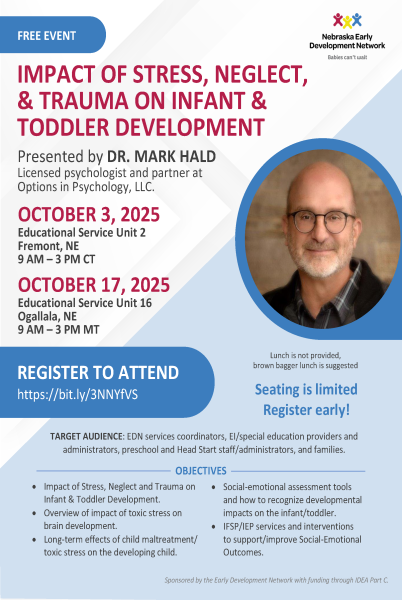Impact of Stress, Neglect, & Trauma on Infant & Toddler Development
Presented by Dr. Mark Hald, licensed psychologist and partner at Options in Psychology, LLC
Objectives
- Overview of impact of toxic stress on brain development.
- Long-term effects of child maltreatment/toxic stress on the developing child.
- Social-emotional assessment tools and how to recognize developmental impacts on the infant/toddler.
- IFSP/IEP services and interventions to support/improve Social-Emotional Outcomes .
TARGET AUDIENCE: EDN services coordinators, EI/special education providers and administrators, preschool and Head Start staff/administrators, and families.
Handouts
Must register to attend. Register by selecting a date and location below.
Seating is limited - Register early! Lunch is not provided, and brown bagger lunch is suggested.
More about Dr. Mark Hald:
Dr. Hald provides assessment and intervention for infants and toddlers, children, adolescents, and their families.
Dr. Hald has over 30 years of experience working with young people and their families in a broad variety of settings, including schools, residential treatment centers and psychiatric hospitals. He has an extensive background in both mental-behavioral health and school psychology, and worked in various educational, programmatic and therapeutic roles in schools, hospitals and universities before before entering private practice as a psychologist. He has taught at the college and university level since 1986.
In addition to his clinical work, Dr. Hald currently provides psychological consultation to local schools, the Educational Service Unit #13 Head Start programs, the CAPStone Child Advocacy Center, the Nebraska Circle of Security Programs, and several community agencies. An active member of a local infant/toddler mental health group, he is also past-president of the Nebraska Association of Infant Mental Health. He is a registered Circle of Security (R) Parenting Facilitator and a Circle of Security Fidelity Coach for Circle of Security International. He regularly speaks and presents on topics related to attachment, trauma, and other behavioral and mental health topics, and has led numerous workshops and presentations regionally, nationally and internationally.
Dr. Hald can trace his interest in mental health service to his time volunteering at a state hospital and residential treatment home for adolescent boys in college. Since then, he has been driven to ensure that infants, children and families receive the compassionate, community-driven and evidence-based support, services and care they need in order to thrive.
